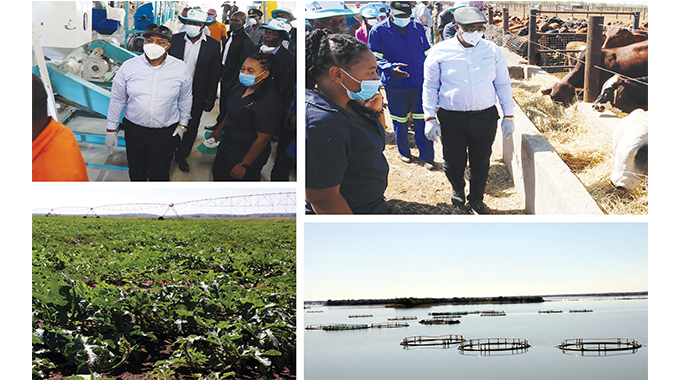Government prioritises irrigation schemes

Mashudu Netsianda in Beitbridge
GOVERNMENT is working to economically transform the lives of thousands of villagers living in areas around Zhovhe Dam in Beitbridge District by creating a greenbelt through harnessing water from the massive dam to irrigate 10 000 hectares of arable land.
Zhovhe Dam, which was built in 1995 by an Italian company, is one of country’s major dams and has been lying idle for years without benefitting the local communities.
It is envisaged that once the irrigation scheme is operational, it will promote food and nutrition security in the country, which is reeling under the effects of climate change and recurrent drought.
Speaking soon after touring Topic Investment Farm in Mazunga area in Beitbridge District yesterday, Vice-President Constantino Chiwenga, who chairs the Cabinet Food Security and Nutrition Cluster, said Government is prioritising the development of irrigation schemes across the country as part of efforts to address the food shortages and minimise grain imports, thus saving foreign currency.
“Our major concern as Government is that everyone should be food and nutrition secure in our country from Zambezi to Limpopo. The persistent adverse weather patterns characterised by short rain seasons, recurrent droughts and below to normal rains, which we are experiencing have left Government with no choice, but to pursue and vigorously promote adaptation strategies,” he said.
“We are currently working on developing 10 000 hectares of land for irrigation purposes. Through water saving technologies Zhovhe Dam can support irrigation of up to 10 000ha. When we develop the irrigation scheme, out of those 10 000ha, 7 000ha will be allocated to commercial farmers with the remaining 3 000ha reserved for communal farmers.”
Matabeleland South, which falls under regions 4 and 5 where dry land cropping is a major challenge, is endowed with abundant underutilised water resources and good soils with vast potential for cropping under irrigation.
Government, through the Ministry of Lands, Agriculture, Water and Rural Resettlement, has put in place the National Agricultural Policy Framework, which enunciates short, medium and long-term strategies to address food and nutrition insecurity.
VP Chiwenga said the short-term strategies include the rehabilitation and development of new irrigation schemes, establishment of nutrition garden and promotion of growing and consumption of traditional grains.
The Government initiated the Traditional Grains Programme starting in the 2019/20 summer cropping season.
“Our traditional grains adapt better to the poor rainfall conditions, which we are now experiencing from year to year. The traditional grains provide food of high nutritional value, can be used in a variety of ways and are cheaper to produce because of lower fertiliser requirements than maize,” he said.
VP Chiwenga said Covid-19 and the lockdowns throughout the world should be a wakeup call for developing countries to be more self-dependent.
VP Chiwenga said under this year’s Winter Wheat programme, Government is targeting 80 000ha with Treasury supporting 65 000ha while the private sector will fund the remaining 15 000 ha.
With a target of average yield of 5,2 tonnes per hectare, the country expects to harvest 416 000 tonnes this year, surpassing the annual consumption requirement of 400 000 tonnes by 16 000 tonnes.









Comments